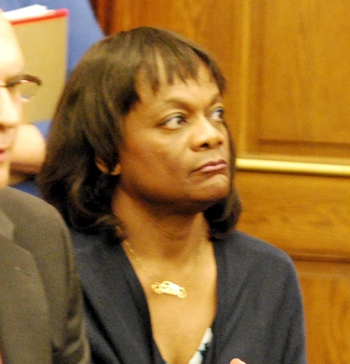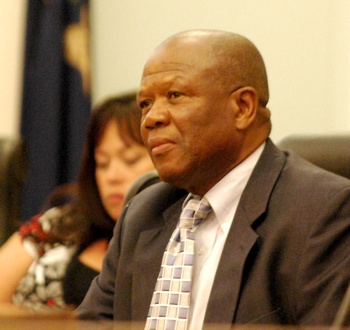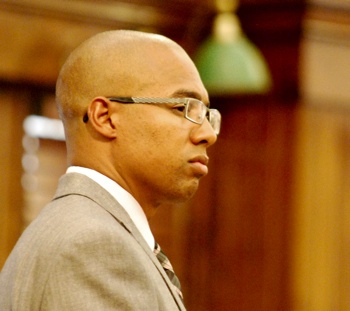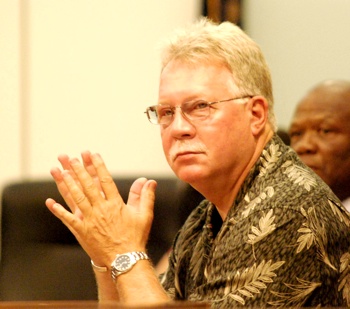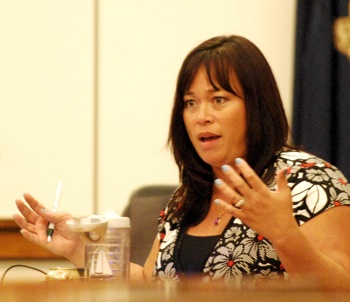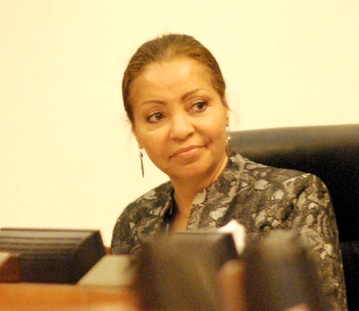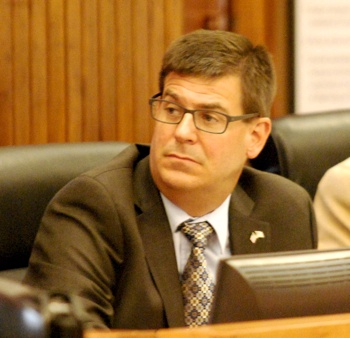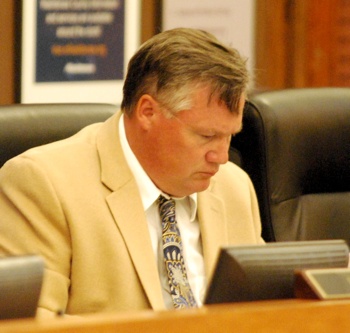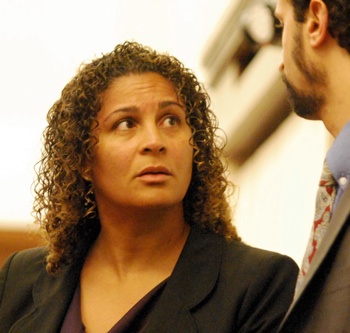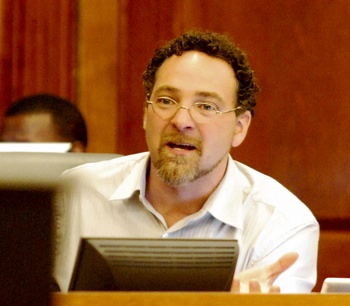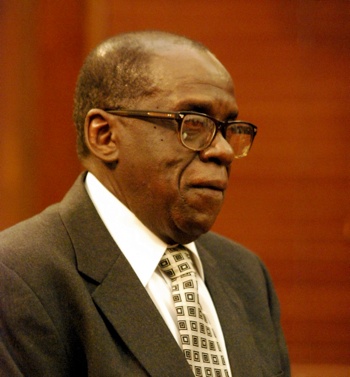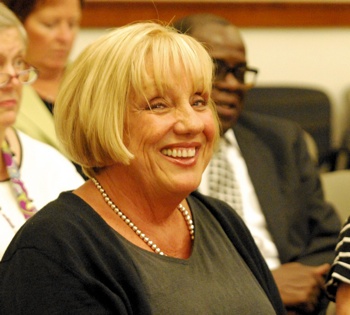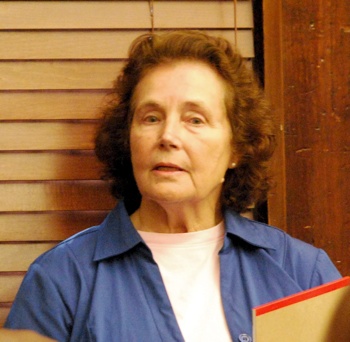County Concerned by Rise in Juvenile Crime
Washtenaw County board of commissioners meeting (July 9, 2014): An increase in violent crime committed by teens in Washtenaw County has spurred the need for additional funding from the county’s Child Care Fund. County commissioners have authorized using $642,707 from the Child Care Fund balance to pay for a range of services overseen by the county’s dept. of human services.
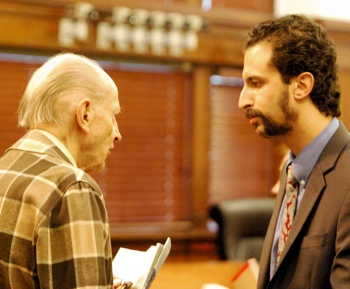
From left: former Congressman Wes Vivian talks with Washtenaw County board chair Yousef Rabhi (D-District 8) before the board’s July 9 meeting. Vivian is advocating for the board to put a proposal on the Nov. 4, 2014 ballot regarding the U.S. Supreme Court’s Citizens United ruling. (Photos by the writer.)
Linda Edwards-Brown, the county’s juvenile division administrator, told commissioners that there’s been an increase in young men “terrorizing” their communities. The sheriff’s office and court had started working together several months ago after they began observing an increase in gang-type activity, she said, including home invasions, firearm larceny, and assaulting police officers. They’d been hopeful that they could stem the tide of violence, she added, but it had escalated with a death in Ypsilanti earlier this summer.
So the sheriff’s office and court officials have reached consensus to remove some of these young men from the community and put them into residential facilities in other parts of the state, Edwards-Brown said. The juvenile division of the Washtenaw County trial court will place at least six youths in residential facilities this month, in addition to six youths who are currently in residential placements. According to a staff memo, residential placements are costly, with a typical length of stay at nine to twelve months.
At the July 9 meeting, commissioners and staff expressed the need to continue working on this issue as a community-wide effort.
In other action, commissioners were asked to pass a resolution making mid-year budget adjustments and allocating this year’s higher-than-expected property tax revenues, as well as putting the $3.9 million surplus from 2013 into unearmarked reserves.
The adjustments passed on a 6-2 vote, with Dan Smith (R-District 2) and Conan Smith (D-District 9) dissenting. Andy LaBarre (D-District 7) was absent. Dan Smith objected to spending more than was budgeted and making budget changes outside of the annual budget affirmation process, which takes place later this year. Conan Smith didn’t state his reason for voting against it on July 9, though in the past he has advocated for spending more of the surplus, rather than setting it aside in the fund balance.
Commissioners also authorized putting a proposal on the Nov. 4, 2014 ballot to renew a 10-year, 0.2353-mill countywide parks and recreation operations tax. They held public hearings related to other millages that the county plans to levy later this year: (1) for support of indigent veterans and their families; and (2) to fund economic development and agricultural activities, under Act 88. The hearings drew one speaker – Thomas Partridge.
Related to the health department, the board created a new board of health to help oversee public health services in the county. A state official was on hand to talk about the accreditation process that the Washtenaw County public health department completed earlier this year.
Commissioners voted to accept the recommendations of a task force that’s been working on a funding strategy to help end homelessness, and to sunset that task force. The board also made appointments to a new committee that’s charged with exploring funding options for road repair.
Several issues were raised during public commentary. Former Congressman Wes Vivian urged the county board to place a proposal on the Nov. 4, 2014 ballot enabling Washtenaw County voters to ask the state to support a constitutional amendment to overturn the Citizens United decision. That U.S. Supreme Court ruling has resulted in corporations “sloshing big money into our elections at all levels,” Vivian said.
Also during the meeting, commissioners honored Arthur Williams, who is retiring as principal of Huron High School in Ann Arbor after 19 years in that job. The board also passed proclamations welcoming the United Association (UA) of plumbers and pipefitters and the Ironworkers International. Both unions hold training programs in Washtenaw County each summer.
At the beginning of the meeting, Rabhi asked for a moment of silence in memory of Rowan David LaBarre, the newborn son of commissioner Andy LaBarre and his wife Megan LaBarre. Rowan David had passed away earlier in the week. “We all pray and hold Rowan in the light of our prayers and thoughts,” Rabhi said.
Funding to Address Juvenile Crime
The July 9 agenda included a resolution authorizing the use of $642,707 from the Child Care Fund balance to pay for a range of services overseen by the county’s dept. of human services. The use of $642,707 will drop the Child Care Fund balance from $1,041,882 to $399,175. [.pdf of staff memo]
The resolution authorized an amendment to the Child Care Fund (CCF) budget for the current fiscal year. The request came from the Washtenaw County Trial Court’s juvenile division and the county’s department of human services – the entities that oversee programs supported by the CCF.
According to a staff memo, the CCF is a collaboration between the state and county circuit courts to support programs that serve neglected, abused and delinquent youth in Michigan. The state reimburses counties for 50% of all eligible CCF expenses.
The specific request on July 9 was for an increase in the CCF budget from $1,872,928 to $2,500,000 for the 2014 county fiscal year, which runs from Jan. 1 through Dec. 31 – an increase of $642,707.
Expenditures for the children’s services department are expected to be $262,341 over the current budget during the county fiscal year. Those expenses relate to use of part-time temporary staff as well as overtime, according to the staff memo, “to ensure that Children’s Services remains in compliance with state licensing requirements for juvenile detention facilities.”
In addition, the Trial Court’s juvenile division planned to put at least six youths in out-of-home placements in July. Another six youths are already placed. The typical length of such placements is nine to twelve months at an average $260 per day, per youth. That cost can range from a low of $150 to a high of $522. The total cost for the remainder of the county fiscal year is projected to be $396,000.
In addition, detention beds in the county’s children’s services facility have been occupied at or near capacity for all of 2014, which has resulted in the need for part-time temporary staff as well as overtime pay.
Funding to Address Juvenile Crime: Board Discussion
Ronnie Peterson (D-District 6) asked about the timing of this request. Linda Edwards-Brown, the county’s juvenile division administrator, clarified that the request for funding is for the county’s fiscal year, through Dec. 31. However, the Child Care Fund (CCF) budget is aligned with the state’s fiscal year, from Oct. 1 through Sept. 30. Edwards-Brown noted that the budget amendment would run only through Dec. 31, 2014. “We’ll be back here in a few months to look at the 2014-2015 Child Care Fund budget,” she said.
Peterson expressed interest in seeing long-term budget projections. It’s not about the money, he added, but it’s important to find out what’s happening in the juvenile justice system. The county needs to know what its financial obligations are to address some of the issues that are occurring in the community, which are causing youth to end up in detention facilities.
Edwards-Brown told commissioners that a group of young men are “terrorizing” their communities. They are carrying weapons, displaying weapons on social media, committing home invasions, and stealing guns.
Several months ago, the sheriff’s office and the court started working together as they saw the beginning of what seemed to be gang-type activity, Edwards-Brown said. “We were hopeful that we would be able, by working together, to stem this tide of violence that we’re seeing in the community. We were unable to do that.”
Last month, a young man was murdered in Ypsilanti, Edwards-Brown said. It’s a problem that the sheriff’s office had predicted, she added. Now, collectively, the court and sheriff’s staff have decided they need to remove the young men from the community, she said. “So that’s the answer as to why we’re here tonight asking for more money for residential placements.”
The trial court has made a concerted effort over the last several years to keep youth in the community and work with them in their homes, Edwards-Brown said. But at this point, public safety is an issue, as well as the safety of these young men, she said. They can’t be “safely maintained” in the community, and need to be taken outside their homes, she said.
Derrick Jackson, director of community engagement for the sheriff’s office, reported that last summer, deputies started to notice an increase in juvenile violence and an escalation in crimes that juveniles were committing. He noted that in the early 1990s, there was gang activity in the area and a lot of those gang members were taken off the streets for 10-15 years. The question since then has been how can the community change so that when those men got back out, “things won’t go back to the way they were,” he said.
Fortunately, those men didn’t go back to criminal behavior, Jackson added, but some of their children, younger siblings and other relatives are now in their teens, and are starting to get involved in gang-type activity. The good thing about having a conversation now is that it’s at an early stage, he said, “and we’re hoping we can prevent some of this.”
They’re not saying that the answer is to lock up every kid who’s associated with these things, Jackson stressed. But this is one of the answers for a small percentage of kids who are very violent, carrying weapons, doing drugs and who ultimately committed homicide.
A large task force is coming together to talk about a “holistic, wrap-around response to what we’re seeing in the community,” Jackson said, because it’s such a significant issue. He noted that about 55 community leaders – including some county commissioners – had met recently to talk about the juvenile criminal justice system, and everyone had seen an increase in problems. When he talks to high school and middle school teachers in the eastern part of the county, they all say the same thing – they see a difference in how young people are acting.
Jackson said that when you see the train coming down the track, you can prepare to get run over or you can figure out a way to stop it. People in the county are working to stop the train, he said.
Lisa Greco, the county’s youth center director, noted that juvenile detention is where kids are placed when law enforcement removes them from the community. They’re held in secure custody until decisions can be made about what to do next. The juvenile detention center has seen more than a 25% increase in population and days of care, Greco said. Managing the dynamics in the community is challenging, she said, and managing those kids in the confined space of juvenile detention is also a challenge. “I think we’ve been up to it, and have taken good care of the kids,” she said.
The community is at a crossroads, Greco added. There’s a need for an immediate response, as well as a call to action to re-examine the juvenile justice system in Washtenaw County in its entirety. “We need alternatives to juvenile detention,” she said. There needs to be early identification, intervention and assessment for kids who are struggling in the community.
Rolland Sizemore Jr. (D-District 5) expressed concern about the kids who’ll be sent to places outside of Washtenaw County. “What happens when they get done and come back here?”
Edwards-Brown replied that none of the young men will be sent out of state. They’ll be sent to Maxey Boys Training School in Whitmore Lake, Turning Point Youth Center in St. Johns, and other facilities within Michigan. “We want them to have the opportunity for their families to visit them and to participate in family therapy while they’re in these placements,” she said.
These young men will eventually be returning home in nine to 12 months, Edwards-Brown noted. So it’s important to bring change to their homes, so that they won’t be returning to the same situation, she said.
Sizemore advocated for having an individual or entity examine all the programs in the county that help youth. He thought there were duplicative services, and the services should be better coordinated. He also hoped the school districts would get involved, and that parents would be supported. He praised Jackson, sheriff Jerry Clayton and deputies for doing difficult work. But it’s time to stop studying the situation and to put some money directly into programs that will help youth, he said.
Alicia Ping (R-District 3) said she first heard about the Ypsilanti murder on Facebook, from a friend who lived in that neighborhood. She thought that by removing these young men, it will help the community as a whole. It will provide hope to the people living there, since they won’t be living in a place of fear. It’s important to let residents know that the community cares about what’s happening in those neighborhoods, Ping said, and that action is being taken to help.
Edwards-Brown stressed that “this may not be the panacea.” Although the additional funding will help remove a certain number of young men, “there are brothers and sisters and nieces and nephews and cousins – so we have a bigger problem that we have yet to address,” she said. “We’re hoping to, quite frankly, save lives – the lives of these young men, and perhaps someone else in the community. But our work is far from done.”
Peterson said the problem isn’t just isolated to Ypsilanti – it’s something happening nationwide. He noted that the funding for this request is coming from the Child Care Fund reserves, but it’s unclear where funding will come from in the future. It could be a budget that inflates much higher, because the county has an obligation to provide services to all youth in need, he said.
Peterson suggested that the county administrator, Verna McDaniel, and the county board chair, Yousef Rabhi (D-District 8), work with staff to identify budget projections and future demand for services. If there’s a trend, the board should be aware of it well in advance, he said. “This is not going to be a gang haven,” he said. “The is not the Wild West.” Washtenaw County has the reputation as a great place to raise children, and they need to maintain that, Peterson added.
Jackson offered to make a presentation to the board with more details about the responses that are being planned. He said he’d spoken with three different mothers who had noticed that their sons were changing, but who couldn’t find help until the situation had escalated. That’s what needs to be addressed, he added – how to structure something in this community that will align the human services with the real issues that need attention.
Conan Smith (D-District 9) drew attention to the fact that fund balance is being used. The CCF fund balance will be depleted by two-thirds with just this one allocation, he noted. It’s an important allocation, and the kind of thing that fund balances are used for, he added. “But we’re doing it regularly now – dipping into departmental fund balances for programmatic expenditures.”
At the same time, Smith noted, the board is set to add money to the general fund reserves. He expected to see other proposals from departments later this year, also requesting to use their departmental fund balances. “This is a fiscal policy question that we really ought to be grappling with,” Smith said.
McDaniel pointed out that it’s actually a $1.3 million problem – the county’s $642,707, plus an equal amount that will be reimbursed by the state.
Outcome: Commissioners unanimously approved the Child Care Fund budget amendment.
Mid-Year Budget Adjustments
Commissioners were asked to pass a resolution making mid-year budget adjustments and allocating this year’s higher-than-expected property tax revenues, as well as a $3.9 million surplus from 2013.
The adjustments increased the general fund budget’s expenses and revenues by $720,486 for 2014, $733,233 for 2015, $745,980 for 2016 and $758,727 for 2017. The county operates on a four-year budget, with the fiscal year matching the calendar year.
The adjustments also followed the recommendation of county administrator Verna McDaniel, and set aside the $3,920,818 surplus from 2013 in unearmarked reserves, rather than spending it. The projected year-end 2014 fund balance is $20,638,675. The county board had previously approved a goal of holding a fund balance equal to 20% of its general fund budget. For 2014, the general fund budget is $103,127,202. [.pdf of staff memo and mid-year budget resolution]
In addition, the following mid-year budget adjustments were made to the general fund:
- Structural adjustments resulting in a $494,677 increase in expenditures for (1) providing employee health care coverage for autism; (2) a consultant to help with the board’s budget priority work, (3) a “local government initiatives” intern; (4) reinstatement of two full-time equivalent positions in the sheriff’s office; and (5) salary adjustments for non-union employees.
- Non-structural, one-time, adjustments that increased expenditures by $65,000 for homelessness initiatives.
The administration recommended that the remaining $160,809 be held as an undesignated allocation until budget projections improve as new information becomes available. The administration will present a second-quarter budget update at the board’s next meeting on Aug. 6, 2014.
Mid-Year Budget Adjustments: Board Discussion
Dan Smith (R-District 2) noted that it’s been less than three months since Raman Patel, the county’s equalization director, told the board about higher-than-expected tax revenues, which resulted in about $750,000 more revenue this year than had been budgeted for 2014.
Now, the board is already spending almost $600,000 of that surplus, which hadn’t been included in the original 2014 budget, Smith noted. There is no shortage of things to spend this money on, he continued, including over $234 million in unfunded liabilities “which we have no particular plan to pay for, other than amortizing payments over 26 years – something that our actuary is recommending against us doing.” The actuary would like to see that amount amortized over a much shorter period of 10 years.
Smith said he had no problem with making technical budget adjustments as they come along. But one of the reasons to have a four-year budget is to have a plan and then execute that plan, Smith said.
If the board wants to “be constantly in budget mode,” he said, then they could simply have a one-year budget. Unless there’s an emergency situation or deadlines that are outside of the county’s control, he thought it would be more appropriate to make these changes in the fall, during the board’s annual budget reaffirmation process.
There was no additional discussion on this item.
Outcome: The budget adjustments were passed on a 6-2 vote, over dissent by Dan Smith (R-District 2) and Conan Smith (D-District 9). Andy LaBarre (D-District 7) was absent.
County Parks & Rec Millage
The board was asked to pass a resolution that would authorize putting a proposal on the Nov. 4, 2014 ballot to renew a 10-year countywide parks and recreation operations millage.
The resolution on July 9 was for an amended version, compared to a resolution given initial approval on May 21, 2014. That’s because some state-mandated information had inadvertently been left off the proposed ballot language in the original resolution, according to a staff memo. [.pdf of staff memo]
The operations millage was first authorized by voters in November 1976 at 0.25 mills for a 10-year period and has been renewed three times. Because of the state’s Headlee amendment, the rate that’s actually levied has been rolled back and is now 0.2352 mills. The current millage expires in December 2016.
If renewed again, it would generate an estimated $3.4 million annually – or about half of the parks & rec annual operating expenses. Other revenue sources are admission/gate/membership fees charged seasonally at facilities including the Meri Lou Murray recreation center, the water/spray parks, and the Pierce Lake golf course. Funding is also received from state and federal grants as well as private donations.
The county parks system receives most of its funding from two countywide millages. In addition to the operations millage, another millage pays for capital improvements and park development. It was also originally levied at 0.25 mills, but has been rolled back to 0.2367 mills.
In addition, a third millage – levied at 0.25 mills but rolled back to 0.2409 mills – funds natural areas preservation, bringing in about $3 million annually. It was first approved by voters in 2000, and renewed for another 10 years in 2010.
The county’s parks & recreation department is overseen by a separate entity – the parks & recreation commission – whose members are appointed by the county board. The county board has the authority to put a parks millage proposal on the ballot, but does not authorize expenditure of the funds. That responsibility rests with the parks & recreation commission. The group meets monthly at the parks & recreation office at County Farm Park, and its meetings are open to the public.
County Parks & Rec Millage: Board Discussion
Conan Smith (D-District 9) advocated for support of this millage in November. The county parks & recreation commission has done incredible things, he said. [Conan Smith serves on the commission, along with Dan Smith (R-District 2) and Rolland Sizemore Jr. (D-District 5).] There’s a park or preserve or recreation facility in nearly every community throughout Washtenaw County, and most of the county facilities are free to the public, he noted. The parks & rec commission also leverages funds from the state, Smith added, on projects like the Border to Border trail. It’s worthy of the continued support of county citizens, he concluded.
Yousef Rabhi (D-District 8) said he hears a lot from people around the state and nation about how unique the county parks & rec system is. He also supported the millage renewal.
Outcome: The board unanimously approved placing the millage renewal on the Nov. 4, 2014 ballot.
Appointments
There were two sets of appointments on the July 9 agenda – for a road funding committee, and the board of public works.
Appointments: Road Funding Committee
Commissioners were asked to approve appointments to a new committee that’s charged with exploring funding options for road repair.
The board had created the road funding committee on June 4, 2014, after debating whether to levy a countywide road millage or put a millage proposal on the Nov. 4, 2014 ballot to fund road repair. The final vote to create the committee had been 6-1 vote, over dissent from Conan Smith (D-District 9). Commissioners Yousef Rabhi (D-District 8) and Dan Smith (R-District 2) were absent.
In arguing against levying a tax at that time, some commissioners cited the need to study funding options – including a possible Act 283 levy, which doesn’t require voter approval – before making a decision.
On July 9, Rabhi proposed an amendment to his original resolution, adding two new slots – one for the director of the Washtenaw Area Transportation Study (WATS), and one for an additional county commissioner slot, to make it an odd-numbered roster.
Rolland Sizemore Jr. (D-District 5) wondered why nine members were needed. Rabhi said he wanted to add the WATS representation because that group has been doing a lot of work on the road funding issue, and would like to participate. “It’s less a matter of the number of people, and more a matter of who we have at the table,” Rabhi said.
Outcome on amendment: Commissioners approved the amendment on a voice vote.
The following members were nominated by Rabhi:
- Lew Kidder, representing the general public
- Bill McFarlane, representing the road commission
- Roy Townsend, managing director of the road commission
- Rolland Sizemore Jr., the county board of commissioners’ liaison to the road commission
- Dan Smith, county commissioner
- Kent Martinez-Kratz, county commissioner
- Rodrick Green, Superior Township trustee, representing townships
- Steve Powers, Ann Arbor city administrator, representing incorporated municipalities
- Ryan Buck, director of the Washtenaw Area Transportation Study (WATS)
The resolution directs the committee to meet within 60 days of this appointment to elect officers and draft bylaws. The committee is to report to the county board at its Sept. 17, 2014 meeting, and make quarterly updates after that with a final report due in December 2015.
The county administrator will help provide administrative support to the committee.
For additional Chronicle coverage on road-related issues, see: “County Board Continues Weighing Road Tax,” “County Board Debates Expanded Road Commission,” “County Board Sets Hearing on Road Tax,” “County Considers Road Funding Options,” “No Major Change Likely for Road Commission” and “Group Explores Road Commission’s Future.”
Outcome: Commissioners unanimously approved the appointments to the road funding committee.
Appointments: Board of Public Works
Yousef Rabhi nominated Steve Feinman to the county’s board of public works for the remainder of a three-year term ending Dec. 31, 2015.
According to the department of public works website, the board of public works “focuses on assisting local communities within Washtenaw County in addressing environmental and public health issues and development needs, including wastewater disposal and collection, water treatment and supply, lake management, and solid waste management.”
There was no discussion on this appointment.
Outcome: Feinman’s appointment was made on a unanimous vote.
Public Hearings: Act 88, Veterans Relief Millages
The board held two hearings on July 9 related to millages that the county plans to levy later this year: (1) for support of indigent veterans and their families; and (2) to fund economic development and agricultural activities.
For support of indigent veterans, the county’s position is that it is authorized to collect up to 1/10th of a mill without seeking voter approval. That’s because the state legislation that enables the county to levy this type of tax – the Veterans Relief Fund Act, Public Act 214 of 1899 – predates the state’s Headlee Amendment. The county first began levying this millage in 2008, and collects the tax in December. Services are administered through the county’s department of veterans affairs.
Since 2008, the county board has slightly increased the rate that it levies each year. In 2012, the rate was 0.0286 mills – or 1/35th of a mill. It was raised to a rate of 1/30th of a mill in December 2013, to fund services in 2014.
The current proposal is to levy 1/27th of a mill in December 2014, which is expected to raise about $540,887 in revenues for use in 2015.
No increase is proposed for the economic development millage, levied under Act 88 – another pre-Headlee law. The proposal is to levy 0.07 mills in December 2014, raising an estimated $1,022,276 in property tax revenues. In previous years, the resolution setting this millage has outlined how the revenues would be allocated. The largest allocations have gone to the county’s office of community & economic development, and to the nonprofit Ann Arbor SPARK.
However, at its Nov. 6, 2013 meeting, the board adopted a new policy for allocating Act 88 revenues, drafted by Conan Smith (D-District 9). [.pdf of Act 88 policy] The policy included creating an Act 88 advisory committee to make recommendations to the board and prepare an annual report that assesses how Act 88 expenditures have contributed toward progress of goals adopted by the board. The policy allows the committee to distribute up to 10% of annual Act 88 revenues without seeking board approval. The policy also allocates up to 30% of revenues to the county office of community & economic development, which administers Act 88 funding.
On July 9, only one person – Thomas Partridge – spoke at these public hearings. He endorsed the veterans relief millage, and questioned whether it would provide sufficient support for indigent veterans. He also questioned whether the amount levied under the Act 88 millage was sufficient for a county this size.
Outcome: This was not a voting item. A vote to levy these millages would be made at a future meeting.
Task Force on Homelessness
Commissioners were asked to accept the report and recommendations of a task force that’s been working on a funding strategy to help end homelessness. The resolution also sunsets that task force.
The leadership group for the Task Force on Sustainable Revenues for Supportive Housing Services to End Homelessness made a presentation at the board’s May 22, 2014 working session. Their recommendations include the goal of building a $50 million endowment over 20 years. Payouts from the endowment would fund supportive services – such as treatment for mental illness and substance abuse – with the intent of addressing the root causes of homelessness. The concept is called permanent supportive housing, and is part of the community’s broader Blueprint to End Homelessness, which was created in 2004 and is being updated.
A possible millage – recommended at 0.25 mills, for no more than 20 years – would help fund supportive services while the endowment is built. County commissioners are being asked to consider putting such a millage on the ballot, possibly in 2015.
Several steps have already been taken to achieve these goals. An endowment was established in 2011, with $2.1 million in commitments so far. That amount includes a $1 million gift from the St. Joseph Mercy Health System to create the endowment, which is called the Sister Yvonne Gellise Fund for Supportive Services for Housing. Gellise is the former CEO of St. Joe’s. She served on the task force and is a founding board member of the Washtenaw Housing Alliance. Another $1 million commitment comes from the Ann Arbor Area Community Foundation (AAACF), where the endowment is housed. AAACF CEO Cheryl Elliott is another task force member. In addition, an anonymous donor has contributed $100,000.
The first fund distribution – of $26,100 – will be made this fall in a competitive grant process. AAACF’s distribution committee – an all-volunteer group – will be responsible for making grant recommendations.
AAACF is also helping provide a three-year, part-time development job to support fundraising for this endowment. Funding for the position will come from the Washtenaw Housing Alliance ($25,000), the AAACF ($5,000) and an anonymous donor ($10,000).
The foundation posted the position earlier this summer, with the intent of making a hire as soon as possible. The position would be in place until at least mid-2017. The employee will report to AAACF’s vice president for development and donor services, and to the Sister Yvonne Gellise Fund development committee. Members of that committee are the same people who’ve served on the leadership team of the task force, Elliott said. In addition to herself, members include Bob Chapman, Sister Yvonne Gellise, Bob Guenzel, Norm Herbert and Dave Lutton.
There was no discussion on this item at the July 9 meeting.
Outcome: Commissioners unanimously voted to accept the report and sunset the task force.
Public Health Accreditation
Mark Miller, director of local health services with the Michigan Dept. of Community Health, attended the July 9 meeting to talk about the accreditation process that the Washtenaw County public health department completed earlier this year. [.pdf of letter from Dept. of Community Health director]
Miller thanked commissioners and staff, including county health officer Ellen Rabinowitz and retired health officer Dick Fleece, who both attended the July 9 meeting. Miller presented certificates of accreditation, and praised the achievement. It’s the fifth cycle that Washtenaw County has completed, passing stringent standards in the accreditation program, he said. The standards are hard to meet, Miller added, especially when budgets are tight.
Ten program areas were reviewed, and of 140 indicators, the Washtenaw County health department only missed one, Miller reported. “I don’t get to go to too many counties and get to say that – generally, [other counties] miss quite a few more.” Washtenaw County eventually achieved 100%, he noted.
Washtenaw County also passed an optional quality improvement supplement, which only about half of the health departments in Michigan have achieved, Miller reported. It means the county has a comprehensive program for improvement.
“This performance is no fluke,” Miller told commissioners. The Washtenaw County health department maintains many partnerships, which allow it to leverage resources and provide better services for residents. That’s admirable, he said.
Miller highlighted several comments included in the accreditation report, including praise for the health department’s website and for support from county commissioners for initiatives like breastfeeding-friendly policies. He called out Sharon Sheldon, the program administrator for health promotion and disease prevention, for her unit’s work. Special recognition is deserved for the HIV/STD program, the report noted, because client return rates for HIV test results have exceeded 96%. Programs in hearing and vision care were also commended, as was the food safety unit, overseen by Kristen Schweighoefer, and several other programs. Miller also noted that Washtenaw County is a pioneer in trying to manage requests for vaccine waivers.
Miller concluded by saying the state was very impressed by the county health department’s efficient and innovative programs. “You guys have a really terrific health department here,” he said.
Board of Health
A resolution to create a board of health was originally on the board’s June 4, 2014 agenda for final approval, but was postponed until the July 9 meeting. The entity would provide advice on public health issues for the county. Commissioners had given initial approval to the item at their May 21, 2014 meeting.
A description of the board’s duties is outlined in a staff memo that accompanied the resolution:
The purpose and role of a Washtenaw County Board of Health will be to identify public health problems and concerns in the community, establish health priorities, and advise the Board of Commissioners and the Health Department on issues and possible solutions. The Board of Health will serve as advocates and educators for public health services and policies. The Board of Health will provide oversight and guidance to the Health Department, and will recommend a program of basic health services to the Board of Commissioners.
The new Board of Health will have the authority to hear appeals and requests for variances from the local public health and environmental regulations established under the Public Health Code. The Board of Health will have the authority to hear appeals regarding the suspension or revocation of food service licenses.
The resolution creating the health board also dissolves an existing environmental health code appeals board and the hearing board for the Health Department Food Service Regulation. The duties of those boards would be absorbed by the new health board. [.pdf of staff memo]
The recommended size is 10 members, including one ex-officio representative from the county board of commissioners. According to the staff memo, appointments could represent “health service delivery (physicians, dentists, mental health practitioners, administrators); environmental health and conservation, land use planning, food service and nutrition, academia, K-12 education, philanthropy, social service delivery, legal services, and consumers of public health services.”
Members would be compensated for attending each meeting. The total cost for the health board, including in-kind staff support, is estimated at $19,000 annually. The board of health would be expected to convene for the first time in October 2014.
Ellen Rabinowitz, the county’s public health officer, attended the July 9 meeting but did not formally address the board.
Board of Health: Board Discussion
Conan Smith (D-District 9), who had moved to postpone the resolution last month without explanation, told commissioners on July 9 that he had distributed three amendments to the board via email. All of them are making additions to the resolution, he said.
Smith noted that commissioners have talked about a board of health taking a leadership role in the county, coordinating public health responses across many agencies. He thought it was important for the board of health to think actively about its role as a coordinator, so one of his amendments included that sentiment in a whereas clause.
Smith also proposed adding two resolved clauses. One clause clarified the roles and expectations of the board of health, to do three things: (1) develop and oversee the strategic plan for the department of health; (2) recommend the annual budget to the county administrator; and (3) work with the county administrator to evaluate the performance of the county public health officer.
The second additional resolved clause is to ensure that the bylaws that will be developed for the board of health will be brought to the county board of commissioners for review and approval. “That’s the document that’s truly going to delegate any authorities that we have from this board,” Smith said.
There was no discussion on these amendments.
Outcome: Smith’s amendments were approved on a voice vote.
There was no additional discussion.
Outcome: On a 7-1 vote, commissioners approved creation of a board of health, over dissent from Rolland Sizemore Jr. (D-District 5). Andy LaBarre (D-District 7) was absent.
Later in the meeting, Ronnie Peterson (D-District 6) said that establishing the board of health is a major step in improving the health for residents of this community, especially children.
Communications & Commentary
During the July 9 meeting there were multiple opportunities for communications from the administration and commissioners, as well as public commentary. In addition to issues reported earlier in this article, here are some other highlights.
Communications & Commentary: Budget Work
Felicia Brabec (D-District 4) reported that Susan McGraw has been hired as a consultant to work with the board on its budget priorities. That work will kick off later this month, she said.
Communications & Commentary: Taubman Fellowship
Yousef Rabhi (D-District 8) reported that he’d learned a lot earlier this summer at Harvard University’s Program for Senior Executives in State and Local Government at the John F. Kennedy School of Government. Ronnie Peterson (D-District 6) pointed out that Rabhi had received the Taubman Fellowship for Executive Excellence, which is given to selected officials and staff through the Southeast Michigan Council of Governments (SEMCOG). Peterson said that to be chosen for a fellowship is one of the highest recognitions that SEMCOG awards. “We should be honored to know that Washtenaw County and a Washtenaw County commissioner was selected,” Peterson said, joking “I just don’t know why they didn’t ask me.”
Communications & Commentary: Proclamations
Several proclamations were given during the July 9 meeting.
Communications & Commentary: Proclamations – Retirements
Board chair Yousef Rabhi (D-District 8) presented a proclamation honoring Arthur Williams, who is retiring as principal of Huron High School in Ann Arbor. [.pdf of Williams' proclamation]
Rabhi noted that he graduated from Huron High School “and Dr. Williams was my principal!” Williams was also a neighbor to Rabhi’s family as Rabhi grew up, so he knows Williams well. Williams has served as principal at Huron High since 1995.
Williams spoke briefly. As educators, he said, “we touch the future.” Many times they don’t know what the effects are of what they do in the schools, he added. Williams noted that Martin Luther King said everyone can be great, because everyone can serve. Williams said his goal has been to try to make this world a better place, by helping raise young people and families, and by trying to make an impact on lives.
He received a round of applause from commissioners and staff.
The board also made a proclamation to Mary Sue Coleman, who recently stepped down as president of the University of Michigan. Coleman did not attend the July 9 meeting.
Communications & Commentary: Proclamations – Ironworkers, UA
Mary Kerr, president of the Ann Arbor Visitors & Convention Bureau, was on hand to receive a proclamation welcoming the Ironworkers International annual instructor training program, which ran from July 12-18 this year. That program, held at Washtenaw Community College, brought in about 700 participants and an estimated economic impact of $2 million. It’s their fifth year holding the program in Washtenaw County. [.pdf of Ironworkers proclamation]
The board also gave a proclamation welcoming the United Association (UA) of plumbers and pipefitters for their 61st annual training program. For the past 25 years, that program has been held in Washtenaw County. [.pdf of UA proclamation]
This year, the program runs from Aug. 9-15, also on the WCC campus, bringing about 2,400 participants to the county with an estimated economic impact of $5 million.
Kerr noted that the county also hosts the training week for the National Joint Apprenticeship and Training Committee (NJATC) for the Electrical Industry. This year is a milestone for all three groups, she said. NJATC is in its 25th year and has been coming to Washtenaw County for six years. This year, the NJATC National Training Institute runs from July 26-Aug. 1 at the University of Michigan, and expects a 15% increase in participation compared to last year, Kerr reported.
Kerr said that a conservative economic impact estimate for all three programs is $12 million. “This is new spending in our community – spending that wouldn’t be here if these three training programs were not here,” she added. The spending is on hotels, restaurants, recreation, entertainment, shopping and transportation.
Her goal is to keep these events in Washtenaw County by providing a high level of service and making sure the unions know that they’re appreciated by the community. She thanked commissioners for their continued support.
Communications & Commentary: Proclamations – Gun Safety
The board passed a proclamation declaring July 20-26 as Gun Safety Week in Washtenaw County. [.pdf of gun safety resolution] The goal is to increase public safety “by raising awareness and educating residents of Washtenaw County about how to keep themselves and their families safe.”
During the week, local law enforcement agencies will be providing free gun locks and gun safety information. More information about the week is provided on the county’s website.
Communications & Commentary: Public Commentary
Speaking during public commentary, former Congressman Wes Vivian told commissioners that until four years ago, the U.S. had laws that prohibited or limited contributions by corporations to candidates for political office.
But four years ago, the U.S. Supreme Court overturned those laws in the Citizens United decision, he said. Now, “corporations are sloshing big money into our elections at all levels,” Vivian said. Polls show that about 90% of U.S. citizens oppose that Supreme Court decision. Furthermore, almost 20 state governments have asked the U.S. government to enact a constitutional amendment to overturn the Citizens United decision. “To date, the state of Michigan has not done so, even though it’s been asked to,” Vivian noted.
The Ann Arbor and Ypsilanti city councils have asked Michigan’s government to take action on this issue, Vivian said. But so far, the state legislature has refused to bring it up for a vote, he added. He asked the county board to place a proposal on the Nov. 4, 2014 ballot enabling Washtenaw County voters to ask the state to support a constitutional amendment to overturn Citizens United. He didn’t have suggested wording for such a ballot proposal, but said he’d be glad to work on it.
Yousef Rabhi (D-District 8), the board’s chair, thanked Vivian and said he hoped the board would take action of some sort at a later date. It was an issue about the sustainability of this nation’s democracy, he said.
Conan Smith (D-District 9) also thanked Vivian for raising this issue. The idea of corporate personhood has raised many challenges, he said, “and the notion that just regular citizens are somehow second class in our decision-making process has got to be pre-empted.” It’s incumbent upon elected officials and the county board as a body of elected officials to take a stand, he said. Smith liked the idea of asking county residents to weigh in, saying it would send a great signal to people throughout the state and nation.
Ruth Ann Jamnick also addressed the board during public commentary. She pointed out that she’s one of the four candidates in the Aug. 5 Democratic primary election for the District 5 seat on the county board. She provided a handout with information about her experience and accomplishments.
Referring to the board’s discussion about juvenile crime earlier in the evening, Jamnick noted that she had been involved in addressing similar issues years ago in Ypsilanti Township. What makes it different now are the ages of the young people who are involved, she said. At that time, it was youth in their late teens – but now, the youth who are creating these problems are younger. It’s important to make some changes and address these issues. She also noted that the situation isn’t isolated to Ypsilanti Township.
Jamnick concluded by thanking Rolland Sizemore Jr., the district’s current commissioner, for his work.
Earlier this year, Sizemore announced that he did not intend to seek re-election. In addition to Jamnick, the three other Democratic candidates are Victor Dobrin, Wilma Gold-Jones, and Keith P. Jason. The winner of that primary will face Republican Timothy King in the Nov. 4 general election. King is unopposed in the primary.
Thomas Partridge introduced himself as a recent candidate for the state legislature. He urged the public to elect Democrat Mark Schauer as governor in November, and to address the critical needs of affordable housing, public transportation, human rights and health care in Washtenaw County. Too many residents are vulnerable and don’t have the services they need, he said. He criticized the county board’s agenda for not including items that address ending homelessness, providing affordable housing and access to countywide public transportation, and supporting better health care and education for adults. These should be priorities for the board, he said.
Present: Felicia Brabec, Kent Martinez-Kratz, Ronnie Peterson, Alicia Ping, Yousef Rabhi, Rolland Sizemore Jr., Conan Smith, Dan Smith.
Absent: Andy LaBarre.
Next regular board meeting: Wednesday, Aug. 6, 2014 at 6:30 p.m. at the county administration building, 220 N. Main St. in Ann Arbor. The ways & means committee meets first, followed immediately by the regular board meeting. [Check Chronicle event listings to confirm date.] (Though the agenda states that the regular board meeting begins at 6:45 p.m., it usually starts much later – times vary depending on what’s on the agenda.) Public commentary is held at the beginning of each meeting, and no advance sign-up is required.
The Chronicle could not survive without regular voluntary subscriptions to support our coverage of public bodies like the Washtenaw County board of commissioners. Click this link for details: Subscribe to The Chronicle. And if you’re already supporting us, please encourage your friends, neighbors and colleagues to help support The Chronicle, too!




